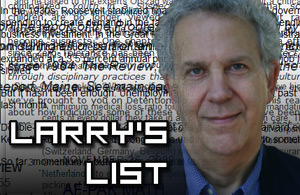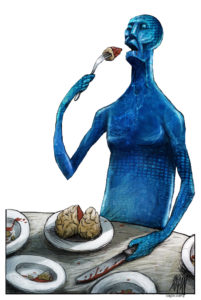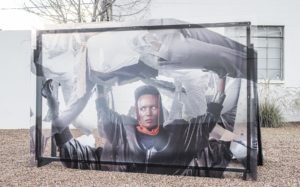The ‘Trustworthiness of Beards’ Edition
Research shows that people just trust people with beards, "hypersociable" kids are less racist and iPads are messing up Princeton's network. Get the details on these stories and more after the jump.
Research shows that people just trust people with beards, “hypersociable” kids are less racist and iPads are messing up Princeton’s network. Get the details on these stories and more after the jump.
On a regular basis, Truthdig brings you the news items and odds and ends that found their way to Larry Gross, director of the USC Annenberg School for Communication. A specialist in media and culture, art and communication, visual communication and media portrayals of minorities, Gross helped found the field of gay and lesbian studies.
The links below open in a new window. Newer ones are on top.
Princeton U. Blocks iPads From Its Networks Because of Malfunctions Princeton University is keeping some iPads off the campus wireless network because of a glitch that causes performance problems on the entire system.
The Trustworthiness of Beards The way you gain people’s trust is to earn it over time by repeatedly proving that you deserve it. That, or grow a beard.
“Hypersociable” Kids Are Less Racist Children with the genetic condition known as Williams syndrome have unusually friendly natures because they lack the sense of fear that the rest of us feel in many social situations. Now, a study reported in the April 13th issue of Current Biology, a Cell Press publication, suggests that children with Williams syndrome are missing something else the rest of us have from a very tender age: the proclivity to stereotype others based on their race.
Sarah Palin’s Luxe Speaking Contract Spurs Investigation in California A document found in the trash at a California state university trash [bin] reveals the luxe treatment Sarah Palin will receive when she speaks there this summer — and has triggered a state investigation into university officials’ refusal to disclose details of the contract, the Associated Press reports.
First the Catholic Church and Now the Rabbis — Is No Child Safe? As the Vatican struggles with fresh headlines on scandals of child sex abuse, the Jewish communities throughout the world have been embroiled in a similar plague.
Decoding Social Media Mysteries Hanson Hosein wants to lead you on an expedition into uncharted territory. It will be expensive, and even your guides will not always know exactly where you are going. But if you can come out with a better understanding of the lawless and sometimes hazardous terrain, the returns will be well worth the investment.
Sorry, Museum: This Is for Your Own Good Five students at the University of Southern California are staging an intervention. The addict? An unsuspecting campus art museum that exhibited a conventional dependence on its previous art show, “Four Rooms and a View: USC’s Collection Highlights.”
Hiding Porn From the Future
Public Media Corps Fellowship Program The Public Media Corps (PMC) is a new national service that supports creative, sustainable and community-initiated methods for addressing the digital divide in communities of color.
The Future of Journalism Is Written in Neon My search for the I.F. Stone of the 21st century took me to the campus of the University of Southern California and the highly energized office of the Web-based news operation Neon Tommy, sponsored by USC’s Annenberg School for Communication & Journalism.
An Invitation to Unionize The chair of the National Labor Relations Board gave a strong indication here Monday that, now that the board has new members appointed by President Obama, unions could expect it to back collective bargaining rights for graduate teaching assistants at private universities.
Academe on Other People’s Terms? Jay Ruby cautions anthropologists against deploying film and video equipment on terms that are completely determined by an institutionalized media industry with its own assumptions about how stories are supposed to be told and circulated.
The Market Colonization of Intellectuals In many forums over the past decade, public intellectuals seem unable to talk about pressing social issues without performing the equivalent of an academic literature review. …
Your support matters…Independent journalism is under threat and overshadowed by heavily funded mainstream media.
You can help level the playing field. Become a member.
Your tax-deductible contribution keeps us digging beneath the headlines to give you thought-provoking, investigative reporting and analysis that unearths what's really happening- without compromise.
Give today to support our courageous, independent journalists.






You need to be a supporter to comment.
There are currently no responses to this article.
Be the first to respond.